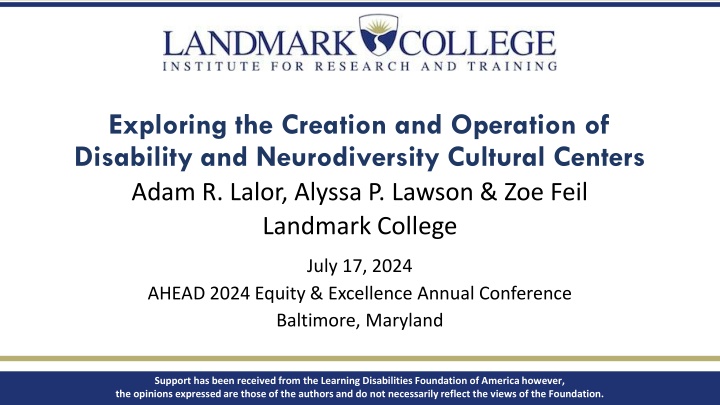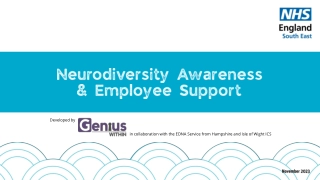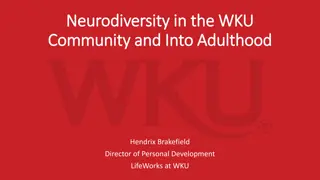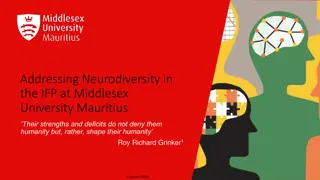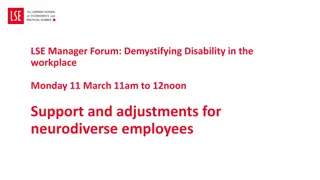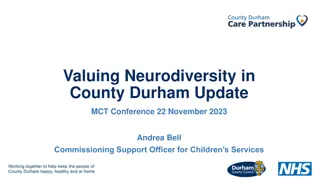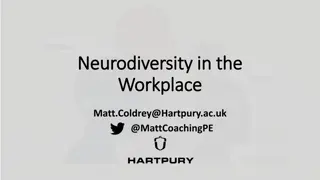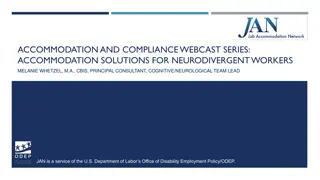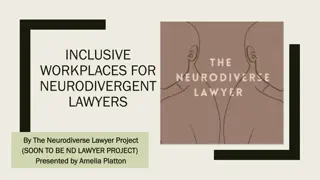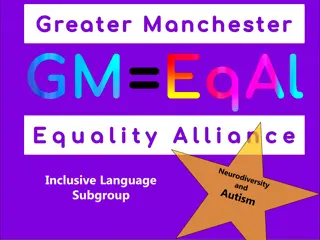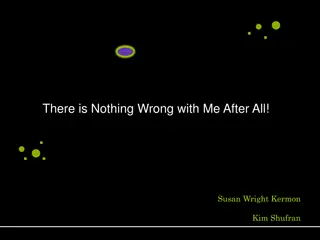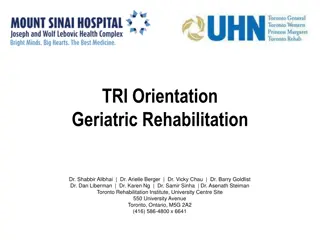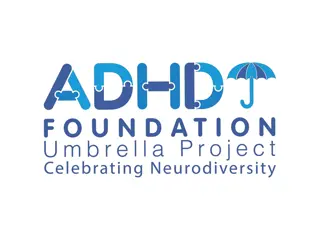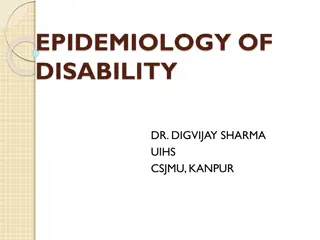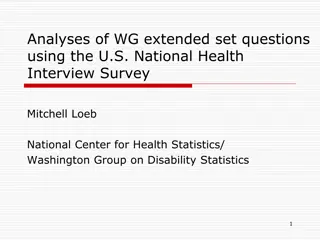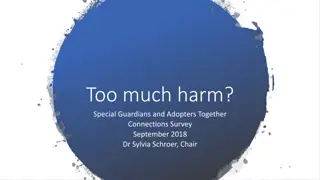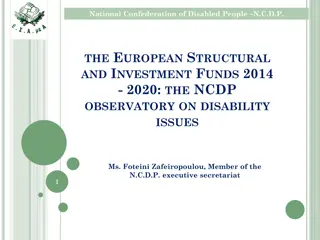Creation and Operation of Disability and Neurodiversity Cultural Centers
This content explores the development and functioning of cultural centers for individuals with disabilities and neurodivergent traits. It delves into research findings, discusses lessons learned, and provides insights on creating similar centers on college campuses to enhance student support and belonging.
Download Presentation

Please find below an Image/Link to download the presentation.
The content on the website is provided AS IS for your information and personal use only. It may not be sold, licensed, or shared on other websites without obtaining consent from the author.If you encounter any issues during the download, it is possible that the publisher has removed the file from their server.
You are allowed to download the files provided on this website for personal or commercial use, subject to the condition that they are used lawfully. All files are the property of their respective owners.
The content on the website is provided AS IS for your information and personal use only. It may not be sold, licensed, or shared on other websites without obtaining consent from the author.
E N D
Presentation Transcript
Exploring the Creation and Operation of Disability and Neurodiversity Cultural Centers Adam R. Lalor, Alyssa P. Lawson & Zoe Feil Landmark College July 17, 2024 AHEAD 2024 Equity & Excellence Annual Conference Baltimore, Maryland Support has been received from the Learning Disabilities Foundation of America however, the opinions expressed are those of the authors and do not necessarily reflect the views of the Foundation.
Facilitator Introductions Adam Vice President, Neurodiversity Research and Innovation, Landmark College Former Co-Director, Center for Neurodiversity, Landmark College Ph.D. in Educational Psychology, University of Connecticut Co-chair, AHEAD Research KPC Identify as both neurodivergent and disabled Landmark College Institute for Research and Training 2
Facilitator Introductions Alyssa Research Associate, Landmark College Institute for Research & Training, Landmark College Ph.D. in Psychological and Brain Sciences, University of California, Santa Barbara Identifies as neurodivergent Landmark College Institute for Research and Training 3
Facilitator Introductions Zoe Research Assistant, Landmark College Institute for Research & Training, Landmark College B.A. in Psychology, Landmark College Identifies as neurodivergent Landmark College Institute for Research and Training 4
Agenda Brief review of the literature Overview of the research study Discussion of findings on the development and operation of disability and neurodiversity cultural centers Lessons learned Discussion Creating a center on YOUR campus Q&A Landmark College Institute for Research and Training 5
Review of the Literature Disabled and neurodivergent students have lower graduation rates than their non-disabled peers (Newman et al., 2011). Many articles highlight the importance of connectedness, social supports, belonging, and safety to college success. Neurodiversity and disability cultural centers provide one path to potentially support neurodivergent and disabled students develop an increased sense of institutional belonging (Chiang, 2020; Saia, 2019). Landmark College Institute for Research and Training 6
Review of the Literature (continued) Limited research on the development and operation of disability and neurodiversity cultural centers (DCC; see Elmore et al., n.d., & Saia, 2019) and they are *largely* focused on a single institution s center. Shout out to: Dr. Trayle Kulshan City University of Seattle Disabled Student Experiences With Disability Cultural Centers and Disability Culture in U.S. Higher Education Landmark College Institute for Research and Training 7
Purpose To explore how US DCC have been developed and how they operate. Support others who wish to develop similar centers at their institutions. Landmark College Institute for Research and Training 8
Overview of the Present Study: Participants 20 DCC were identified and invited to participate in survey 10 Respondents: Director, Co-Director, Associate Director, and/or Program Coordinators Most identified as a person with a disability, neurodivergent person, Deaf person, or person protected under ADA Landmark College Institute for Research and Training 9
Overview of the Present Study: Instrument & Analysis Survey containing forced response and open-ended questions. Survey included questions about: The development of cultural center The operation of cultural center Landmark College Institute for Research and Training 10
Findings: Development of Cultural Centers Landmark College Institute for Research and Training 11
WHO INITIATED? Students Faculty Members a faculty member was able to negotiate a space on campus for the office Task-Force student coalition formed and began advocating for a DCC Disability Cultural Center Task Force submitted an initial report recommending the establishing of a Cultural Center on Disability student-led petition students attended Chancellor s Open Office Hours with demand talking points a professor started to use it when he did individual community projects in disability studies A Neurodiversity Taskforce was brought together to discuss how support could be provided for neurodivergent students. Landmark College Institute for Research and Training 12
Was There Funding for Development? 10% 20% Yes No Uncertain 70% Landmark College Institute for Research and Training 13
Experienced Obstacles in Developing DCC? Themes: little to no funding, limited staffing, difficult to convey the importance to others, different viewpoints on how to view disability 22.2% [an obstacle faced was] conveying the importance and meaning of disability culture to administrators, especially among many other student groups requesting space, staff, and funding support Yes 44.4% No Uncertain 33.3% [an obstacle faced was] members who wanted to support but operated from a medial model and others who recognized disability identity through a social justice lens Landmark College Institute for Research and Training 14
Findings: Operation of Cultural Centers Landmark College Institute for Research and Training 15
Current Funding/Facilities DCC Approx. Annual Budget Physical Space of DCC 4 3 # of Responses Single room 20% 20% 2 Single suite 1 0 shared single suite 60% Landmark College Institute for Research and Training 16
Staff Employment # of Full-Time Professionals Working for DCC's # of Part-Time Professionals Working for DCC's 4 7 6 3 5 # of Responses # of Responses 4 2 3 2 1 1 0 0 1 2 3 4+ 0 1 2 3 4+ Landmark College Institute for Research and Training 17
Student (Undergraduate/Graduate) Employment # of Paid Student Employees working at DCC's in last 12 months # of Unpaid Students working for DCC's in last 12 months 6 6 5 5 # of Responses # of Responses 4 4 3 3 2 2 1 1 0 0 0 1 2 3 4+ 0 1 2 3 4+ Landmark College Institute for Research and Training 18
Programs Activities DCCs Engage In 100% 80% % of Respondents 60% 40% 20% 0% Social Educational Programming Field Trips Advocacy Work Research Disability-Related Fundraisers Training Mentorship Programming Programming Landmark College Institute for Research and Training 19
Participants Approx. Number of Student Participants Per Semester Online Participants 4 3 # of Respondents 40% Yes 2 No 60% 1 0 1-50 51-100 101-150 151-200 201+ Landmark College Institute for Research and Training 20
Collaborations Main Collaborators: Other Diversity centers (i.e., multicultural, other disability specific groups, women & gender groups) Disability resource center Other Collaborators mentioned: Counseling services Student activities Student government Athletics Residence Life Landmark College Institute for Research and Training 21
Relationship with Accessibility/Disability Resource Office/Coordinator? accessibility coordinator is an advocate for the DCC The relationship is generally good and we support one another while a passive participant, [disability officer is] willing to contribute or advocate in any way it s the same person Very close! We share ideas, work together to push our campus to do better, train the disability service center in disability justice and history, and bring disability service folks to our programs and events. Landmark College Institute for Research and Training 22
Challenges in Operating DCC Themes: staffing issues, underfunding, lack of space, students with disabilities feeling shame surrounding disability The DCC continues to experience significantly lower funding than the other Identity-based centers 30% Yes No students with assignments to attend a Diversity event impacting the vibe and climate of some of our events 70% [university pushed to] consolidate associate director and director positions into one and forced the associate director to assume the leadership Landmark College Institute for Research and Training 23
Lessons Learned Great variation across the US. Collaboration is critical Disability Resource Professionals are key allies. Although sometimes viewed as being different from other diversity cultural centers, such centers are among the main collaborators of DCC. Most DCC were developed without a budget but secured one once operational. Most DCC leaders believe that they remain underfunded and understaffed. Landmark College Institute for Research and Training 24
Discussion: How Can YOU Begin to Develop a Center? Thinking about your campus How, if at all, would a DCC relate to and support your institution s mission? Who would be important collaborators (internal and external)? What skills, knowledge, or resources would they bring to the table? How would you engage the potential collaborators and the rest of the community in the development of a DCC? What other resources would you need? What is one step that you can take toward developing a DCC at your institution when you get back to campus? Landmark College Institute for Research and Training 25
Q&A Landmark College Institute for Research and Training 26
Certificate program for educators Certificate program for educators Learning Differences and Neurodiversity Learning Differences and Neurodiversity Specializations in: Executive Function | Autism on Campus | Disability Services Five course, 15 credit graduate-level certificate OR take individual courses www.landmark.edu/certificates Landmark College Institute for Research and Training 27
Certificate program for educators Certificate program for educators Learning Differences and Neurodiversity Learning Differences and Neurodiversity Anchored in theory & research Flexible schedule for busy professionals Targets concrete classroom practices Mix of live & asynchronous discussion *Visit us at Booth 212!* Visit us at Booth 30! Landmark College Institute for Research and Training 28
THANK YOU! THANK YOU! Adam R. Lalor, Ph.D. Vice President, Neurodiversity Research and Innovation Landmark College adamlalor@landmark.edu Alyssa P. Lawson, Ph.D. Research Associate Landmark College alyssalawson@landmark.edu Landmark College Institute for Research and Training 29
References Chiang, E. S. (2020). Disability cultural centers: How colleges can move beyond access to inclusion. Disability & Society, 35(7), 1183-1188. Elmore, K., Saia, T., & Thomson, E. A. (2018). Special feature: An introduction to disability cultural centers in US higher education, part I. AHEAD: Association on Higher Education and Disability. https://www.ahead.org/professional-resources/publications/hub/hub-nov- 2018/hub-nov-2018-special-feature-disability-cultural-centers Kulshan, T. (2023). Disabled students experiences with disability cultural centers and disability culture in US higher education (Doctoral dissertation, City University of Seattle). https://www.proquest.com/openview/40a980812d9a350775daac27ab9d76 a7/1?pq-origsite=gscholar&cbl=18750&diss=y Landmark College Institute for Research and Training 30
References (continued) Newman, L., Wagner, M., Knokey, A. M., Marder, C., Nagle, K., Shaver, D., & Wei, X. (2011). The post-high school outcomes of young adults with disabilities up to 8 years after high school: A report from the National Longitudinal Transition Study-2 (NLTS2). NCSER 2011-3005. National Center for Special Education Research. https://eric.ed.gov/?id=ED512149 Saia, T. (2019). Disability as an identity: Disability cultural centers in higher education (Doctoral dissertation, The University of Arizona). https://www.proquest.com/openview/92cd2b11a06ea6da6e776a6fb0e7e7 d8/1?pq-origsite=gscholar&cbl=18750&diss=y Landmark College Institute for Research and Training 31
